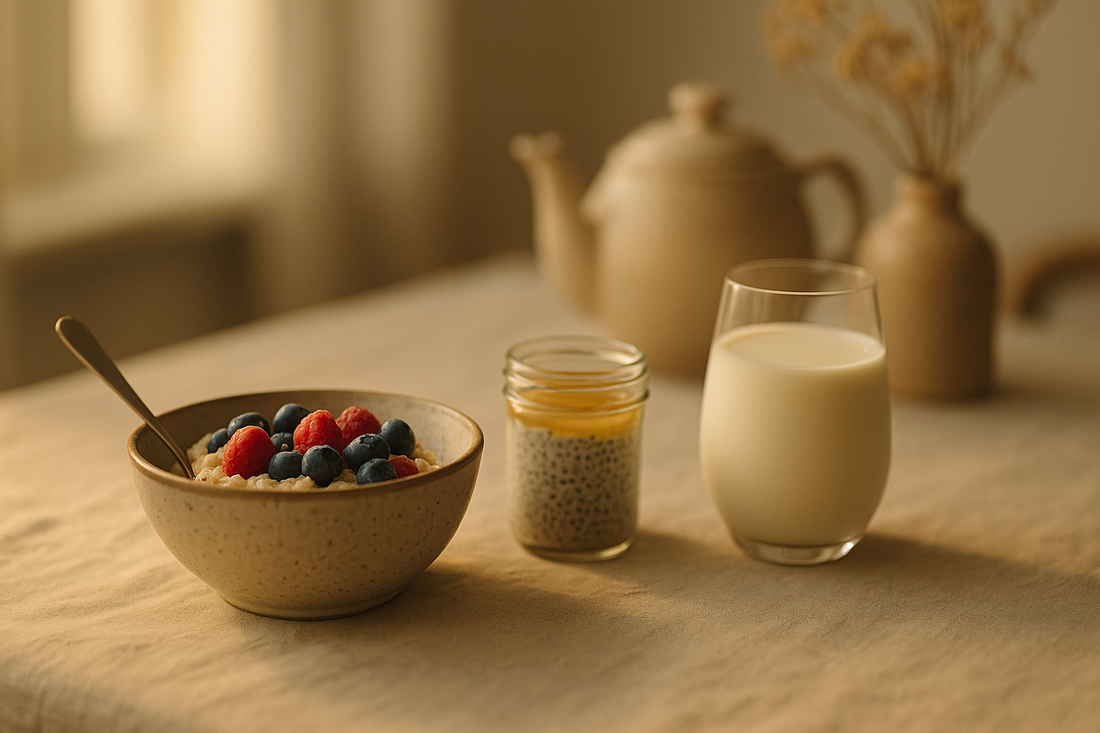
Eczema & Gut Health: What Breastfeeding Mums Should Know (and How to Support Skin Inside & Out)
Share
Google “eczema breastfeeding” and you’ll find everything from “cut all dairy” to “just rub breastmilk on it.” It’s confusing — and often, downright overwhelming.
Busy Mum Highlights
You're juggling a lot—so here’s the bite-sized version:
If your baby is dealing with dry patches, red flare-ups, or constant itching, you’ve probably tried swapping detergents, changing bath products, or tweaking your own diet. The truth? Baby eczema is a complex condition with many possible triggers — from genetics to environmental allergens to your gut health.
The good news: While there’s no single magic fix, there are small, science-backed steps you can take to support your baby’s skin from the inside and outside — without cutting out every food you love.
The Gut–Skin Connection in Baby Eczema
The link between gut health and eczema is called the gut–skin axis — the two-way conversation between your digestive system and your skin.
- If your gut lining is inflamed or out of balance, that inflammation can “spill over” into other parts of the body — including the skin.
- In babies, whose immune systems are still developing, this can mean more skin sensitivity and eczema flare-ups.
- For breastfeeding mums, your gut health doesn’t just affect you — it can influence your breastmilk composition, delivering nutrients, beneficial bacteria, and anti-inflammatory compounds directly to your baby.
Research-Backed Nutrition for Breastfeeding Mums and Eczema Prevention
While internet advice can be a minefield, certain diet changes have stronger evidence:
Probiotics for Breastfeeding Mums
- Specific strains like Lactobacillus rhamnosus GG and Bifidobacterium lactis show promise in lowering baby eczema risk.
- Probiotics work by supporting gut balance and modulating immune responses.
Omega-3 Fatty Acids for Skin Health
- Found in oily fish, flax, and chia, omega-3s help regulate inflammation in both mum and baby.
- Research suggests that higher omega-3 intake during breastfeeding is linked to reduced eczema incidence in babies.
Other tips — like avoiding certain allergens — may be worth exploring with your healthcare provider, but probiotics and omega-3s have the most consistent backing.
Gut-Friendly Foods for Busy Breastfeeding Mums
Because no mum has time for complicated meal prep with a newborn, here’s your quick list of gut-boosting, skin-supportive foods:
- Kefir or probiotic yoghurt: Easy snacks that boost beneficial bacteria.
- Oily fish: Salmon, mackerel, sardines twice a week for omega-3s.
- Flax & chia seeds: Sprinkle into porridge or smoothies for plant-based omega-3 + fibre.
- Colourful vegetables & prebiotic fibres: Carrots, sweet potato, broccoli, leeks, and asparagus feed your good gut bacteria.
How Your Gut Health Affects Baby’s Skin
Your breastmilk is a natural delivery system for:
- Beneficial bacteria (from your gut)
- Anti-inflammatory compounds (shaped by your diet)
- Skin-healing nutrients (like zinc, vitamin A, and essential fatty acids)
When you nurture your own gut health, you’re enhancing the anti-inflammatory, skin-soothing qualities of your milk — giving your baby an internal defence against eczema.
The Inside–Outside Approach to Natural Baby Eczema Care
The most effective natural eczema treatment for babies often combines:
- Inside: Gut-supportive nutrition to reduce inflammation at its root.
- Outside: Gentle, effective skincare that repairs and protects the skin barrier.
This is where the Lait Labs Kit shines.
Created for mums who want total control and transparency, it lets you craft a gentle healing cream from your own breastmilk — naturally rich in antibodies, fats, and growth factors — blended with our plant-based barrier-repair ingredients.
It’s safe for sensitive newborn skin, perfect for eczema patches, nappy rash, and dry spots — a truly natural baby eczema remedy you make yourself.
Your Gentle Path to Calmer Skin
Supporting your baby’s skin can be as much about what’s on your plate as what’s in your nappy bag.
You don’t need an extreme diet or a shelf full of creams. Small, consistent actions — a daily probiotic yoghurt, two servings of oily fish a week, and a jar of cream made with your own milk — can make a real difference.
If you’re ready to try an inside–outside approach to soothing baby eczema, explore our Lait Labs Kit — designed to work hand-in-hand with the skin-loving nutrients you’re already passing on through your breastmilk.
Explore Lait Labs Kit📚 References & Further Reading
Maternal probiotic supplementation during pregnancy & breastfeeding
- Rautava S, Kainonen E, Salminen S, Isolauri E. J Allergy Clin Immunol. 2012.
- Dotterud CK, Storrø O, Johnsen R, Oien T. Br J Dermatol. 2010.
Cochrane / systematic reviews on maternal elimination diets
- American Academy of Pediatrics. PMC3237513
- Osborn DA, Sinn JKH. Cochrane Database Syst Rev. 2013.
Omega-3 fatty acids & oily-fish intake
- Nip Allergies – Eczema & food allergy prevention
- Medical News Today – Eczema diet: foods to eat
Added sugar, ultra-processed foods & gut dysbiosis
- DESSNA Dermatology Blog
- Healthline – Dietary Changes for Eczema
Fermented foods, prebiotics & Mediterranean-style eating
- Altitude Dermatology
- Healthline – Foods to Eat & Avoid
Breastmilk applied topically vs 1% hydrocortisone
- Kasra-Kermanshahi R, et al. J Dermatolog Treat. 2021.

